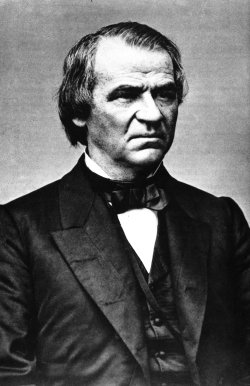Search This Blog
Thursday, January 5, 2012
Andrew Johnson
Served as president from 1865-1869
Era: Reconstruction Era
American Identity and Culture
During Andrew Johnson’s presidency, the American people had just suffered through a terrible civil war with tremendous losses of lives. To make matters worse, the country’s previous president was assassinated. As the vice president, Johnson assumed the responsibility of president after Lincoln’s assassination. The job of Reconstruction was placed in his hands as the American people struggled to recover from the war’s devastating consequences. The issues at hand were the treatment of the now emancipated blacks and whether they should be accepted as citizens, and the punishment for the southern states that seceded.
Economic Transformations and Globalization
The Fourteenth Amendment was ratified in 1868. This amendment declared citizens as those born or naturalized within the country. It also required the states to acknowledge U.S. citizens’ rights and give them “equal protection of the laws” and “due process of law.” Other parts of the Fourteenth Amendment were the disqualification of ex-Confederate leaders from being state or federal officials, penalizing a state if it kept someone who was eligible from voting, and repudiating Confederacy debts. By the end of the Civil War, the Confederacy’s economy was already in deep trouble. Since the Union repudiated, or refused to acknowledge, its debts, the Confederate states were saved.
Environment
In 18 66, Russia showed an interest in selling its holdings in North America. When the William H. Seward, the United States’ Secretary of State, offered $7.2 million, the Russians accepted and handed over nearly 500,000 miles of land that would become Alaska. This newly obtained territory differed from previous purchases in that its inhabitants (aside from Native Americans) would become American citizens immediately, but the issue of statehood was unclear. Critics saw the purchase of the frozen land as “Seward’s Folly.” Others saw this as a step to greater American expansion such as the acquisitions of Canada and much of the Northern Hemisphere.
Politics and Citizenship
Andrew Johnson alienated moderate Republicans during his presidency by vetoing two crucial bills. The first bill intended to increase the Freedmen’s Bureau’s services and protection that was offered to all blacks and homeless whites. Meanwhile, the second bill dealt with civil rights and nullified the Black Codes while guaranteeing blacks complete statuses as citizens and equal rights. Congress passed the Tenure of Office Act after Johnson’s veto in 1867. This law did not give the president the right to remove a federal official from their post without approval from the Senate. Johnson saw the law as unconstitutional and challenged it. As a result, the House of Representatives impeached him.
Slavery and its legacies in North America
Even though blacks were finally emancipated, Black Codes were adopted that restricted their rights. The codes stopped blacks from buying or renting land and borrowing money to do so, forced freedmen into semi-bondage once they signed work contracts, and did not allow blacks to testify against whites in court. In 1866, the Civil Rights Act passed the government which declared all African Americans to be citizens of the United States and strived to protect them from the Black Codes in the southern states. This shows that even though the slaves finally achieved their freedom, they were still limited by their lack of rights.
War and Diplomacy
Congress managed to pass three Reconstruction acts in 1867 while Johnson was president. A radical step that these acts took was placing the South under military control. The former Confederate states were divided military districts with each in the Union’s control. The Reconstruction acts also added more requirements for achieving readmission into the Union, which punished the states that seceded by making it more difficult for them to reenter. In order to be able to gain readmission, the Fourteenth Amendment had to be ratified by the ex-Confederate state and it had to guarantee that all adult males had the right to vote, without regard to race.
Subscribe to:
Post Comments (Atom)

No comments:
Post a Comment